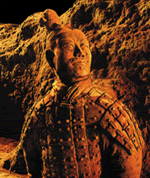


|
Treat your troops to their finest hour with The Art of War - a seminar they will never forget!
Combining the world’s most advanced personality profiling tools with the teachings of the ancient Chinese philosopher, Sun Tzu. Skills that participants can take from the seminar to the workplace the same day. Two of Sun Tzu’s timeless lessons were: ‘Success without conflict is best’ and ‘Those who know themselves and know others will not be imperiled in 100 engagements’ |
|
Why the Art of War is so effective
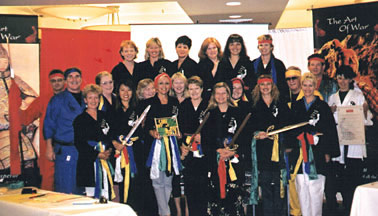
‘People always learn best when they enjoy themselves’
Albert Einstein
The Art of War is fully interactive, fun and challenging.
Where no one is a spectator!
Teaching skills that are not only new and different – these are skills that will work and last to impact performance in this challenging economic environment.
- Participants learn advanced personality profiling skills for a better understanding of their own and others’ core motives, needs, wants and innate strengths.
- Participants are shown how to recognise the ‘personality style’ of others within the first few minutes of an encounter and what to do and what not to do - to best relate to them.
- The focus of The Art of War is on replicating the situations faced within the workplace, when dealing with team mates, customers and new clients in today's challenging and competitive environment.
There is no more effective learning methodology than Created Here – Embraced Here
Every Art of War participant is 100% involved in fun, interesting, enjoyable and highly beneficial experiential learning.
![]()
This ensures an ongoing motivation to apply the skills, eliminating:
“When you convince me - I stay convinced until someone else convinces me otherwise’
Replacing it with: “When I convince myself – I stay convinced”
How the seminar is conducted and experienced:
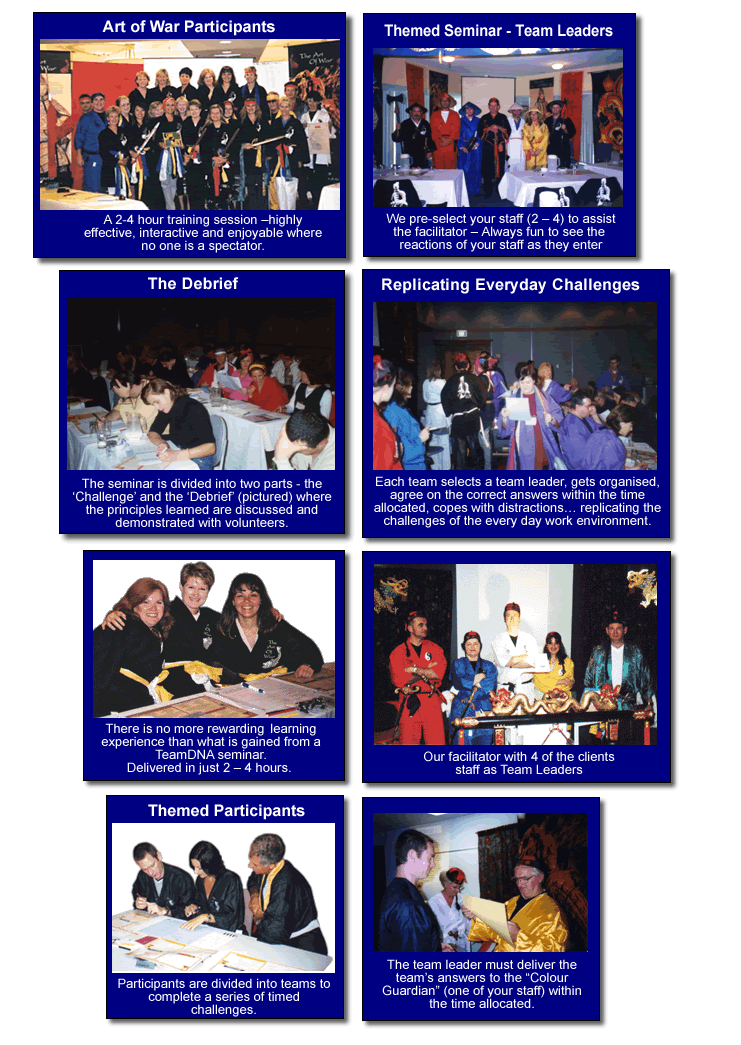
![]()
At the conclusion of the program participants retain a commitment to:
- Team building through a better understanding of others and ourselves.
- Improved Communication, Persuasion and Negotiation skills.
- An understanding of other people’s core motivators and how best to prescribe to that.
- Effective customer-focused needs analysis to create more accurate recommendations.
- Accurate goal setting relative to an individual’s innate strengths.
- Fostering of a more cohesive working environment
- Facilitation and blending of people’s different agendas and priorities.
- Greatly improved sales and recommendation skills through recognising the clients core personality style and knowing what to do and what not to do to maximise a positive outcome.
- Management communication will be more effective when working with an individual’s distinct personality style.
- The Art of War will create a positive and cohesive corporate / team culture through better understanding of each individual’s distinct personality ‘style’ - in a way that is easily understood and just as easily applied.
What Clients Say:
"I would HIGHLY recommend the seminar to any organisation with a team who deals in the transfer of ideas, goods or services to others. All of my staff now use the techniques and language on a daily basis as part of our normal communication dialogue. Without exception I have been asked to convey the thanks and appreciation of all attendees." National Sales Manager. Douglas Pharmaceuticals, Australia
“The most enjoyable and effective team building exercise we have experienced, outstanding long term skills taught in a fun and fully interactive environment where all participants were 100% committed and later praised the value of the training–recommended to any organisation looking to impact team cohesion” Senior Partner- KPMG
"Over the past 35 years myself and my management team have attended countless seminars and training sessions. Without question we all agree that this Team Building seminar conducted by Mr. George May in Fiji to the 90 company directors of the Hunter Douglas dealer network was the best, most enjoyable and effective training we have ever experienced. The energy was tremendous. We use the material on an ongoing basis. I can strongly recommend to any company who wants a fun, interesting and very effective seminar and training program." National Sales Manager. Hunter Douglass
"You described the program as innovative, exciting, practical, effective and fun. I am pleased to say you were correct on all points. The team enjoyed the program like never before and continue to discuss how they apply the information on a daily basis. The seminar was alive and active, allowing no one to be a spectator. It was fantastic!" Training Manager. Alcan Australia
“An enjoyable and beneficial team building seminar, where all participants were asked to comment post seminar– all indicated a very worthwhile and insightful experience that will be of genuine value in interaction with colleagues and clients- very professional” Manager- American Express
The Content- How it is delivered:
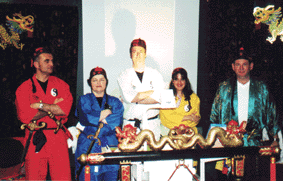 Participants attend expecting the same ‘lecture' on what can typically be a fairly dull subjects - Team Building, Communication, Sales skills etc.
Participants attend expecting the same ‘lecture' on what can typically be a fairly dull subjects - Team Building, Communication, Sales skills etc.
However, as the doors open - they enter a room themed in Medieval China with stirring music, hanging banners of Warriors, Emperors, Dragons, all manner of visual effect.
One of the most predictable outcomes we observe is the surprise and creative comments when the participants see four of their management dressed in bright Red, Blue, Yellow and White "Generals Uniforms" up front with the Supreme Commander (The Facilitator).
Tables are set up in teams of 2 to 6.
Each participant is given a coloured Karate "Team Jacket"
The Supreme Commander begins: "We welcome you to The Art of War - To Gain Success Without Battle - as you stepped through those doors you stepped back in time to 400 BC - to the days of Sun Tzu the greatest strategist of all the Emperors armies..."
![]()
The Colour Code: It is explained that each of the Four Colour Generals (chosen from your staff to assist the facilitator) is a very different "Personality Type".
Colour Coded as Red- Blue -White and Yellow, and each "Colour" has very distinct and different needs, wants and innate strengths.
The participants are then shown what to do and what not do - to have a positive relationship with each.
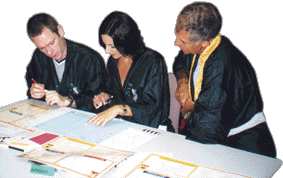 The next session is spent giving the teams a series of challenges to be completed within a time limit.
The next session is spent giving the teams a series of challenges to be completed within a time limit.
The team members choose their answers from a series of questions / statements / situations which will positively motivate each of the four Generals With each correct set of answers,team members receive the next level belt colour, progressing through the nine levels from white belt to the ‘Black Belt of the Supreme Peacefull Warrior’
The winning team members each receive a copy of TheArt of War. Competition is often hillarious and intense!
The Debrief
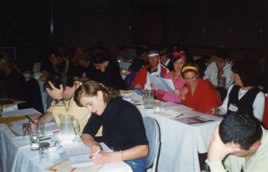 |
After a short break – each participants is given The Debrief Book. The Debrief involves each participant completing a confidential profile understanding where they see for themselves their own "Colour Combination" Team members are asked to volunteer - the principles being taught and applied are shown to be astonishingly accurate relative to their behaviour, personality traits, motivators and strengths. |
The remaining time is spent in showing the strengths and limitations of various personality types with what to do and not to do to maximise Team Effectiveness, Productivity, Communication and Persuasion skills with each.
![]()
Personality Traits are defined simply as Colours,
creating an easily applied and understood language:
‘ Mary is a Blue, she wants everything to be neat and precise - make sure all the boxes are ticked or she will send it back to you, and don’t try to get around her - she has the best sincerity radar you will ever encounter’
” John is a Red on Red!... Get to the point and don’t waffle, show him the bottom line and make sure you are well prepared and look the part - he is a ‘one chance at a first impression person’!
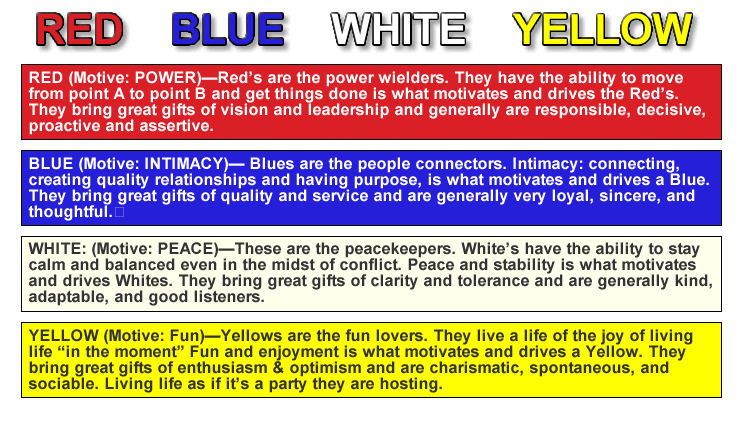
The Art of War enables participants to:
Determine their own Core Motives, in less than 15 minutes.
- "Speak the Language" of others by quickly identifying their Core Motives.
- Build stronger and more meaningful relationships by understanding what motivates behaviour.
![]()
The Art of War is different to ANY other personality profiles on the market today. It is the ONLY assessment that identifies Core Driving Motives.
Most other popular personality assessments strictly identify behaviour, and leave it at that.
The Art of War helps you to understand why people do what they do versus simply what people do.
We can't begin to understand any individual unless we recognise and understand their core personality ‘type’ and what motivates that unique blend.
Once you have experienced The Art of War, you will understand why so many participants now claim that they can never see themselves or others the same again and why the concepts and principles within The Art of War have become one of their most important corporate assets- used daily.
The Art of War is unique in that it is always customised to the team building, corporate cultural change or sales & negotiation skills outcomes that the client most wants.
These are some of the outcomes we have delivered for clients:
- Team building
- Improved Communication, Persuasion and Negotiation skills
- An understanding of people’s core motivators
- Effective customer-focused needs analysis
- Accurate goal setting
- Recognising individual’s innate strengths
- A more cohesive working environment
- Facilitation of different agendas
- sales and recommendation skills
- Management communication.
The skills learned from a The Art of War seminar can create a positive, cohesive culture of better understanding within your organisation in a way that is easily understood and just as easily applied.
Who Can Benefit?
Everyone who is involved in communicating with others, influencing others, or working with team members, the public, clients, or potential clients will benefit from the superb skills learned from an Art of War experience.
The Art of War is the most effective seminar ever for company events where the focus is on developing teamwork, customer focus skills, selling structures and for preparing for events such as a new product launch.
Empowering staff through personal development or in creating a corporate culture based on genuine understanding of others within the organisation.
The skills will lead all participants to a better understanding of themselves and others – skills which they can take from the training room the same day, not only for the business environment but into their private lives and all relationships.
The Art Of War - An enjoyable & highly beneficial seminar your troops will never forget.
Advanced sales & negotiation skills learning
The personality understandings taught in The Art of War are leading edge skills
Being able to recognise the core personality of a client or potential client within one minute of an encounter, and then knowing exactly! what to do and what not to do (which is 100 times more important than what to do!) to maximise their internal buying motivation for your product, service or proposition.
With this recognition the salesperson or manager is able to adjust their presentation style, benefits focus, questions and goals to best create a positive, empathetic environment.
Being able to offer the best proposition, make accurate recommendations and be seen as a highly credible professional by the client or employee.
These skills allow for a crafted presentation that will completely eliminate ALL objections as you won’t create the environment that breeds them.
Being able to create predictable outcomes throughout the presentation as it will guide a process perfectly suited to the clients core drivers – by not trying to control an outcome based on your ‘ perceived features and benefits’.
These skills have resulted in Noble May becoming one of the most effective sales skill trainers in the world (not based on some fanciful imaginations, but based on our successes where, over the past 10 years, we have won over 95% of all presentations to companies, government agencies, associations etc).
There are NO OTHER sales skills or negotiation structures your team could learn that will impact performance more than that which is delivered in The Art of War.
![]()
The Art of War will give your people their best seminar ever – a training session they will never forget with skills that work and last!
It is fun, different, entertaining, exciting and delivers effective and valuable outcomes.
The skills that are learned can leave a tremendously positive impact on the participants, not only in the business environment but in their private lives and all relationships.
Participants will quickly learn how to recognise a client or employees core personality’ type’ through the indicators of language, appearance, business environment, reactions and behaviour.
All of life’s successes come from successful relationships: personally, professionally, and socially.
There is much more to The Art of War
Contact us on: george@noblemay.com.au Or call me personally: George May 0418 115 668
Introduction to TeamDNA & The Art of War
Team Building Activities
TeamDNA and The Art of War are fully interactive stimulating problem-solving tasks designed 3 – 4 hour seminars designed to help group members develop their capacity to work effectively together, understand each others innate strengths and recognise the core motivators of other's within a few minutes of any encounter.
Our team building programs have been used in workshops, training seminars, education programs, corporate training, sport teams, teacher training, youth work, and in therapeutic and correctional settings.
Team DNA and The Art of War can be adapted for virtually any setting, young or old, large or small, and across cultures.
The programs can be facilitated in different ways with different groups for different outcomes leading to a wide variety of different participant experiences
In the hands of our excellent facilitators these seminars will become a significant experience for participants delivering skills which can be taken from the classroom to thew workplace the same day.
Many of our clients report that the culture adopted is being used daily many years after the learning experience
An important part of team building exercises is participants' reflection and discussion about the activity, how they approached the situation, and possible points of learning.
For example, a group could be videoed during an activity and the video watched, analysed, and discussed, to help extract potential learning from team building exercises.
Team Change Management
Change is inevitable. In a challenging global environment, companies and teams need to evolve.
These programs gives you the ingredients for a successful change initiative and lets you navigate the tricky emotional waters when change happens, whether you’re in the driver’s seat or not.
Help your people view change as a positive by delivering practical tools and techniques to inspire them to become change agents.
This program encourages your team to collaborate when driving change and sets the stage for partnering on all levels to both take ownership of the change and unleash the collective wisdom and energy of your people.
In the Change Management Workshop you will:
- Learn why some change initiatives fail while others are successful
- Discover how to create a sense of urgency that energizes people
- Find out how to empower your people to take ownership and be change agents
- Discern what you have power to change and what you don’t
- Uncover ways to help people with the emotional side of change
- Learn what kind of communication is key to successfully navigating change
- Develop a change action plan that leaves room for unexpected change
The Art of War Quotes
The Art of War Seminar by Sun Tzu
The Art of War Seminar Quotes
"The supreme art of war is to subdue the enemy without fighting."
Sun Tzu, The Art of War Seminar
diplomacy, strategy, victory, war 726 people liked it like
"Appear weak when you are strong and strong when you are weak."
Sun Tzu, The Art of War Seminar
deception, life, war 688 people liked it like
"If you know the enemy and know yourself, you need not fear the result of a hundred battles. If you know yourself but not the enemy, for every victory gained you will also suffer a defeat. If you know neither the enemy nor yourself,
you will succumb in every battle"
Sun Tzu, The Art of War Seminar, Special Edition
strategy 452 people liked it like
"Supreme excellence consists of breaking the enemy's resistance without fighting."
Sun Tzu, The Art of War Seminar
politics, success, war 339 people liked it like
"Victorious warriors win first and then go to war, while defeated warriors go to war first and then seek to win"
Sun Tzu, The Art of War Seminar
"All warfare is based on deception."
Sun Tzu, The Art of War Seminar
"Let your plans be dark and impenetrable as night, and when you move, fall like a thunderbolt."
Sun Tzu, The Art of War Seminar
business, strategy, war 224 people liked it like
"Can you imagine what I would do if I could do all I can?"
Sun Tzu, The Art of War Seminar
"To know your Enemy, you must become your Enemy."
Sun Tzu, The Art of War Seminar
"Even the finest sword plunged into salt water will eventually rust."
Sun Tzu, The Art of War Seminar
thought-provoking 157 people liked it like
"Thus we may know that there are five essentials for victory:
1 He will win who knows when to fight and when not to fight.
2 He will win who knows how to handle both superior and inferior forces.
3 He will win whose army is animated by the same spirit throughout all its ranks.
4 He will win who, prepared himself, waits to take the enemy unprepared.
5 He will win who has military capacity and is not interfered with by the sovereign."
Sun Tzu, The Art of War Seminar
"Strategy without tactics is the slowest route to victory. Tactics without strategy is the noise before defeat."
Sun Tzu, The Art of War
"Engage people with what they expect; it is what they are able to discern and confirms their projections. It settles them into predictable patterns of response, occupying their minds while you wait for the extraordinary moment — that which they cannot anticipate."
Sun Tzu, The Art of War
opportunity, people, predictability, surprise 140 people liked it like
"When the enemy is relaxed, make them toil. When full, starve them. When settled, make them move."
Sun Tzu, The Art of War
the-art-of-war 133 people liked it like
"Move swift as the Wind and closely-formed as the Wood. Attack like the Fire and be still as the Mountain."
Sun Tzu, The Art of War
"There is no instance of a country having benefited from prolonged warfare. "
Sun Tzu, The Art of War
military-theory 107 people liked it like
"All warfare is based on deception. Hence, when able to attack, we must seem unable; when using our forces, we must seem inactive; when we are near, we must make the enemy believe we are far away; when far away, we must make him believe we are near."
Sun Tzu, Sun-Tzu: The Art of Warfare
"One may know how to conquer without being able to do it. "
Sun Tzu, The Art of War
"There are not more than five musical notes, yet the combinations of these five give rise to more melodies than can ever be heard.
The Art of War Seminar
There are not more than five primary colours, yet in combination
they produce more hues than can ever been seen.
There are not more than five cardinal tastes, yet combinations of
them yield more flavours than can ever be tasted."
Sun Tzu, The Art of War
diversity, iodic
"When you surround an army, leave an outlet free. Do not press a desperate foe too hard."
Sun Tzu, The Art of War
business, strategy, war 75 people liked it like
"In the midst of chaos, there is also opportunity"
Sun-Tzu, A Arte da Guerra
business, strategy 74 people liked it like
"Treat your men as you would your own beloved sons. And they will follow you into the deepest valley."
The Art of War Seminar
Sun Tzu, The Art of War
"If quick, I survive.
If not quick, I am lost.
This is "death."
Sun Tzu, The Art of War
spy 68 people liked it like
"The greatest victory is that which requires no battle."
Sun Tzu, The Art of War
"So in war, the way is to avoid what is strong, and strike at what is weak."
Sun Tzu, The Art of War
"To win one hundred victories in one hundred battles is not the acme of skill. To subdue the enemy without fighting is the acme of skill"
Sun Tzu, The Art of War
art-of-war, strategy, victory 60 people liked it like
"What the ancients called a clever fighter is one who not only wins, but excels in winning with ease."
Sun Tzu, The Art of War
"He who is prudent and lies in wait for an enemy who is not, will be victorious."
Sun Tzu, The Art of War
"One mark of a great soldier is that he fight on his own terms or fights not at all."
Sun Tzu, The Art of War
"If you know the enemy and know yourself, your victory will not stand in doubt; if you know Heaven and know Earth, you may make your victory complete."
Sun Tzu, The Art of War
Contemporary business-speak has drawn many ideas from the lexicon and argot of military strategy. Alongside Machiavelli's Prince, Sun Tzu's "The Art of War" has been one of the texts cited regularly as a source of razor sharp strategic thinking for the Business world, as much as the political sphere. Ever wondered why it's so famous? Never heard of it? This post demystifies The Art of War's ancient treatise on military strategy – I offer my basic interpretation and spell out step-by-step, its 13 gems of strategic thinking, plain and simple.
If you remember Wall Street; that celluloid homage to Capitalism, you may remember one of its best quotes taken from Chinese philosopher Sun Tzu :
"If your enemy is superior, evade him"
Read on to discover the key elements in this priceless handbook on strategic and tactical thinking.
The Art of War - Sun Tzu
Business Strategy Lessons from The Art of War by Sun Tzu
Master Business Strategy with 13 Tactics from The Art of War
# 1. The Laying of Plans, Calculations and Estimations
The Book states: before any steps are taken, research and planning are the key to any venture. My Interpretation? Any blueprint or business plan has to be compiled with reference to 5 basis points:
Seasonal Factors and Timing
Landscape or Operational Terrain,
Leadership Qualities – wisdom, sincerity, benevolence, courage and strictness
Management skills – covering logistics, methodology and organizational structure
Moral Law – The Way of the World and the Laws of human Nature.
This strategy handbook proceeds to lay out 7 methods for forecasting based on your capabilities these factors. In short it calls for a SWOT Analysis .
Here, it also calls for leaders to adhere to classic principles in Project Management. It advises you to have awareness of your capabilities and surroundings, adjust your plans to suit your resources, and track or monitor your operations against possible deviation from the original plan. Get back on track as quickly as possible, he says.
Once plans are in operation we have to outwit our competition by not betraying our course and be subtle in our direction. One of the most succinct quotes from this treatise says:
"All warfare is based on deception."
# 2. Waging War – The Challenge The Art of War Seminar
The next segment focuses on the importance of decisive behaviour, correct timing and economy in your actions. Before embarking in any ventures, we can minimize challenges, conflict and ensuing costs by:
Focusing on the Logistics of any plan and prevent over-extension of your company's resources.
Maintaining organizational Morale and keeping the "Troops" motivated and well resourced.
Sun Tzu provides us with a clever tip – If you are low on resources and want to save: focus more on exploiting your competitor's weakness rather than throwing more cash/resources at the problem.
Consider the wisdom of having effective Exit strategies in place if something does not work. That reminds me of the (Colin) Powell Doctrine.
My favourite takeaway here is something all marketeers can relate to:
"let your main object be victory, not lengthy drawn-out campaigns. "
# 3. Attack by Stratagem or Planning Offensives
Here Sun Tzu echoes that old adage, its Not Size but Unity that determines strength and organizational effectiveness. He makes that now-famous quote:
"the skillful leader subdues the enemy's troops without any fighting"
In other words, avoid competing head on and avoid using up resources directly against competitors. Aim instead for excellence so that no other organisation would even dare compete. In short, create a natural Monopoly.
How?
In a business environment, I interpret this as taking the initiative and being first to market or innovate. Engage a pre-emptive "attack" on your competitors with your superior offering thus demotivating any would-be contenders with your superior market share. Invent the most innovative product, process, occupy new territory or be the first to secure the marketplace.
Failing that, "Surround them" assuming you have adequate resources to cover the market and try for a Me-too approach.
If y0u have insufficient resources, a Divide and Conquer approach maywork. Segment the market or break your problem into parts and attack each individually.
Failing that – your only option is to meet your (enemy) competitor head on. In business terms I interpret this as a potential Price war.
Failing that you will be forced into a Siege Mentality which is costly for both attacker and the attacked.
Once you run out of resources, will have to Retreat or drop out of the market – become the victim of shake-out.
13 Routes to Mastering Business Strategy using ancient advice from Sun Tzu's Art of War
A Chinese bamboo book – copy of "The Art of War " (on the cover, "孫子兵法") by Sun Tzu. Taken from Wikipedia
Sun Tzu also points out ways you can really screw things up as a leader:
Having insufficient vision and a poor overview of the situation.
This resultsin using the incorrect amount of resources or methods to meet the right challenges.
Not being decisive or flexible enough to exploit opportunities – not knowing when to act / when not to act
Running an organization that does not have the means to respond to your directives & isn't able to act on its own initiative when required. Recruiting of decisive and strong management is essential here.
Conversely, not communicating your Goals clearly and leaving your team to their own devices – the mark of a poor leader who has an undisciplined team.
Poor human resource management skills that utilize the wrong people for the wrong task, the inability to motivate your team or facilitate it.
In other words:
"If you know neither the enemy nor yourself, you will succumb in every battle"
# 4. Tactical Dispositions or Positioning
This phase of his treatise emphasises Defensive behaviour; securing and consolidating the resources you have and using them effectively as a solid base for exploiting new opportunities when they occur. I see this as a reminder to business to get yourr housekeeping in order, be efficient and lean cost-wise. Have insurance or fail-safes before embarking on anything new or risky.
This line says it all:
"One may KNOW how to conquer without being able to DO it"
# 5. Energy & Direction The Art of War Seminar
This Chapter is about capturing momentum and synergy.
"The quality of decision is like the well-timed swoop of a falcon which enables it to strike and destroy its victim."
Sun Tzu outlines Direct and Indirect / Subtle methods of accomplishing your mission or let us call them obvious versus not-so-obvious downright sneaky methods. He encourages us to use these 2 approaches creatively and in tandem.
Being able to alternate methods generates momentum and ensures sustainable results.
Tips on how to "win" the battle include
The Element of Surprise
Deception: Masking your true strength when trying to outflank or outwit your "opponent"
Using Bait to outwit your opponents and draw their true intentions and positions.
Not relying on any one person but instead focusing on the discipline and unity of your team.
Business strategy
# 6. Weak Points and Strong / Illusion versus Reality
Here Sun Tzu helps us spot the best opportunities for attack, how to spot weaknesses in your opponent and position yourself in the most advantageous way. In business terms, I interperate his advice as follows:
Take the initiative rather than play catch up – you may waste more resources playing catch up than in taking entrepreneurial risks.
Be aware of your Competition's weak points, expose them and hasten to do better in these areas quickly.
Be aware of markets or territories where your Competitor has no presence and exploit these gaps.
Be aware of Competitive advantage. Maximise your resources where you possess natural barriers to entry.
Be a Moving target and make it hard for your Competitors to guess your next move.
Never overextend yourself and focus on your Core Competencies. If you have weak organisational flaws, consolidate your resources in strengthening a few critical areas not all of them at once.
Timing is everything- make sure you research the accurate moment with which to activate your plans.
My favourite Line: The Art of War Seminar
"Do not repeat the tactics which have gained you one victory, but let your methods be regulated by the infinite variety of circumstances."
# 7. Manoeuvring and Dealing with Direct Conflict
There will be times when we will still have to meet difficult challenges head on and may not circumvent them. Sun Tzu advises us to maintain the following if we are to emerge unscathed and maximise our tactical advantage.
My key takeaways here:
Personnel - Maintain harmonious relationships between all levels of your hierarchy and create a unity within your organization that operates to an internal discipline. Ensure they get a share of the "spoils" to keep them motivated and help them buy into company Mission.
Logistics – Always ensure clear l lines of supply secured to sustain you throughout your campaign.
Local Knowledge – Make sure you have good local knowledge of your market with an insider's view if possible.
Competition – Know when they are operating at peak strength and only launch your attack when you know they are recovering from another campaign or when they are on downtime.
Do not enter into an Alliance until you are certain as to the motives of your partners
"The difficulty of tactical manoeuvring consists in turning the devious into the direct, and misfortune into gain"
# 8. Variation in Tactics aka The Innumerable Changes
I believe this section talks about the art of Judgement. Good tactics also means knowing What NOT to do. It is not enough to know your business and environment well, you also need Versatility of Mind.
In business terms I interpret this as: knowing what paths not to follow, markets that are not worth pursuing or contracts & alliances that are a No Win for your business.
If subordinate to a higher command, Sun Tzu implies there are situations where you must not even obey your superiors. You could even say it may be a good thing to flout conventional wisdom.
In everything you do, always have the versatility of mind to inhabit the thinking behind Competitors or Customers' actions.
Take a 360 Degree approach to everything you do and be mindful of all your stakeholders in any action you take, this allows you to escape hidden pitfalls or exploit every potential advantage/opportunity not just obvious ones. The sort of thinking can be found in guerrilla marketing approaches or CSR marketing that exploits non- obvious opportunities.
"in the midst of difficulties we are always ready to seize an advantage, we may extricate ourselves from misfortune"
# 9. The Army on the March / Moving the Force
This segment focuses on observing the right signs in your "enemy". I interpret this as the ability to read your environment correctly and forecast effectively based on the current behaviour of your competitors, economy, potential customers and even stakeholders. He goes on to detail clever practical tips for reading your enemy's behaviour on the battlefield.
A great leader has the ability to read the signs around him, track history and therefore be alert to deception or sudden changes by correctly extrapolating future behaviour.
He gives an Acute reading of human behaviour here:
"When envoys are sent with compliments in their mouths, it is a sign that the enemy wishes for a truce."
Business strategy The Art of War Seminar
# 10. Terrain or Situational Positioning
In anything we do – we will encounter points of resistance. How we position ourselves may result in assorted advantages and disadvantages. In the original text, he inventories the types of geographical terrain an ancient army may encounter and prescribes the best positions to take.
My takeaways? Sun Tzu emphasises:
A Point of Vantage. Make sure that no matter where you are, you have a clear view of the endgame.
Sneaky tip 1: when no one makes the first move or you don't know where your competitor is : do a false retreat to draw out your prospective opponents
Sneaky tip 2: if your competitor has a superior position than you , entice them to focus on something else and fool them into vacating their no.1 spot
Secure Lines of supply and good Communications throughout your organization are essential otherwise there's a disconnect between your best laid plans and execution on the ground.
Find yourself trying to match up to your competitor and always trailing behind? Me – Tooism can be a destructive activity that eats up too much resources. You should reconsider the campaign in the first place.
6 signs you are failing as a leader
Flight: when you put your organization against a superior force with no preparation
Insubordination: when management is weak and discipline falls apart.
Collapse: when workers are under resourced
Ruin: when Management does not buy into the organizational mission and rebels.
Disorganization: when there are no clear organizational rules, roles or best practice laid down.
Rout: when the wrong resources or tactics are being used
"The power of estimating the adversary, of controlling the forces of victory, and of shrewdly calculating difficulties, dangers and distances, constitutes the test of a great general."
# 11. The Nine Situations / Terrains
According to Sun Tzu, there are 9 common stages in any campaign. He prescribes reactions to each one in terms of old world battle scenarios. Some prescriptions are obvious..
The Art of War Seminar
1) On Home ground; don't waste too many resources campaigning here.
2) On Entering New territory; keep pushing aggressively early in the campaign as long as nothing gets in the way, and as long as you have a clear easy exit strategy. You aren't too heavily invested at this stage and can turn back if needs be.
3) Contentious ground or Strategically Essential Territory; Do not be the first to move without smoking out your competitors' intentions first and understanding their strategy too. Hide your true interests and distract the competition where possible from discovering them.
4) Open ground or easily Accessible territory - don't get in the way of other competitors assuming their activity is of no strategic relevance to your mission.
5) Ground of Intersecting Highways, where there is activity from more than one interested party or contender – form alliances with others.
6) Serious ground; where much effort was required to secure this territory and you are in a precarious position. It may be hard to exit and hard to move forward – A " Winning Hearts and Minds " policy is required here. Do not antagonize any stakeholders and do your best to sustain all of your business relationships at their optimum levels.
7) Difficult ground or difficult conditions in which to operate – keep going and don't stop until you are in a safer position. In Business terms I interpret this as consolidating resources, being cost conscious and keeping your productivity high, maintaining and pushing for higher targets.
8) Hemmed-in ground; where it is difficult to extricate oneself from this situation – Resort to Deception, Intrigue and Stratagem.
9) Desperate ground; where there is no exit possible – once there you have to stick it out and give it everything you've got, its all about survival.
Sun Tzu compares a Skillful tactician to a species of mountain Snake due to his ability to react quickly
"Strike at its head, and you will be attacked by its tail; strike at its tail, and you will be attacked by its head; strike at its middle, and you will be attacked by head and tail both."
# 12. The Attack by Fire
This next segment does seem a little esoteric especially if trying to apply to contemporary business models – Sun Tzu talks about 5 ways to attack by fire. Nevertheless I see it as a reminder on the strategic ways you can mount an offensive campaign to any competitor (from the inside).
The Soldiers – Poach their personnel , demotivate them or use them ?
The Stores – Attack your competitors financial investments ?
The Baggage Trains – Their logistics, lines of supply or key suppliers?
The Arsenal and Magazines – Attack your competitors cash-cows and sources of Revenue?
Hurl fire on your enemy as Artillery – Attack their operations, throw a spanner in the works ?
Most importantly – Follow up the internal attack with your own offensive on the outside and be resourced, time it right and don't get caught up in the fire.
"Unhappy is the fate of one who tries to win his battles and succeed in his attacks without cultivating the spirit of enterprise; for the result is waste of time and general stagnation."
# 13. The Use of Spies / Intelligence
Sun Tzu warns us against wasteful campaigns that expend a lot of resources or hours of labour when a simple use of intelligence or Foreknowledge would be more efficient.
According to the text it can only be obtained through scout masters, reconnaissance or 5 kinds of spies:
1) Local spies;
2) inward spies;
3) converted spies;
4) doomed spies;
5) surviving spies.
Key pointers here:
The Art of War Seminar Reward your spies liberally and be sagacious yet sincere when dealing with them. Above all keep this operation in utmost secrecy internally.
If you wish to convert someone into a spy – spoil them. A converted Spy is your greatest asset as they can help you recruit more.
"Spies are a most important element in water, because on them depends an army's ability to move."
For a more entertaining (if not slightly hokey) background to the book, I found this Documentary for those military enthusiasts amongst you: The Art of War documentary from the History Channel
Lovers of chess and the Japanese game "Go" will find his book an affirmation and a helpful guide too.
Other interpretations of the Art of War Seminar
The Business Insider Magazine War room does a quick handy overview too in The Art of War – Sun Tzu
In this article: Productivity and "The Art of War": Applying Sun Tzu's Teachings to Business Tucker Cummings translates its teachings into modern goals for productivity.
There's even an Art of War App for the busy executive : The Art of War in Business
In Summary The Art of War Seminar
Throughout my interpretation of The Art of War, runs is a misleadingly simple idea that touches on a fundamental thread in Far Eastern thinking – that paradoxical notion of Doing by Not Doing and Illusion. You will find similar ideas in Taoism, Kung Fu, Fengshui, Zen Thinking and many other Asian practices I will be exploring in the future. Conversely Conflict and disruption are anathema to Far Eastern sensibilities and their philosophy considers chaos and disruption a sign of failure, not a route to success.
In other words, if we can position our businesses into a Harmonious operation with the world around us – beyond the reach of any threat by being superior & indispensible, practising excellence and manipulating our environment to remove all obstacles, success is within our reach. The building blocks you might say of most strategies cited in any Marketing 101 textbook.
Nevertheless I suspect, as time goes by I shall unearth deeper or different interpretations from this book as I understand more of the world.
